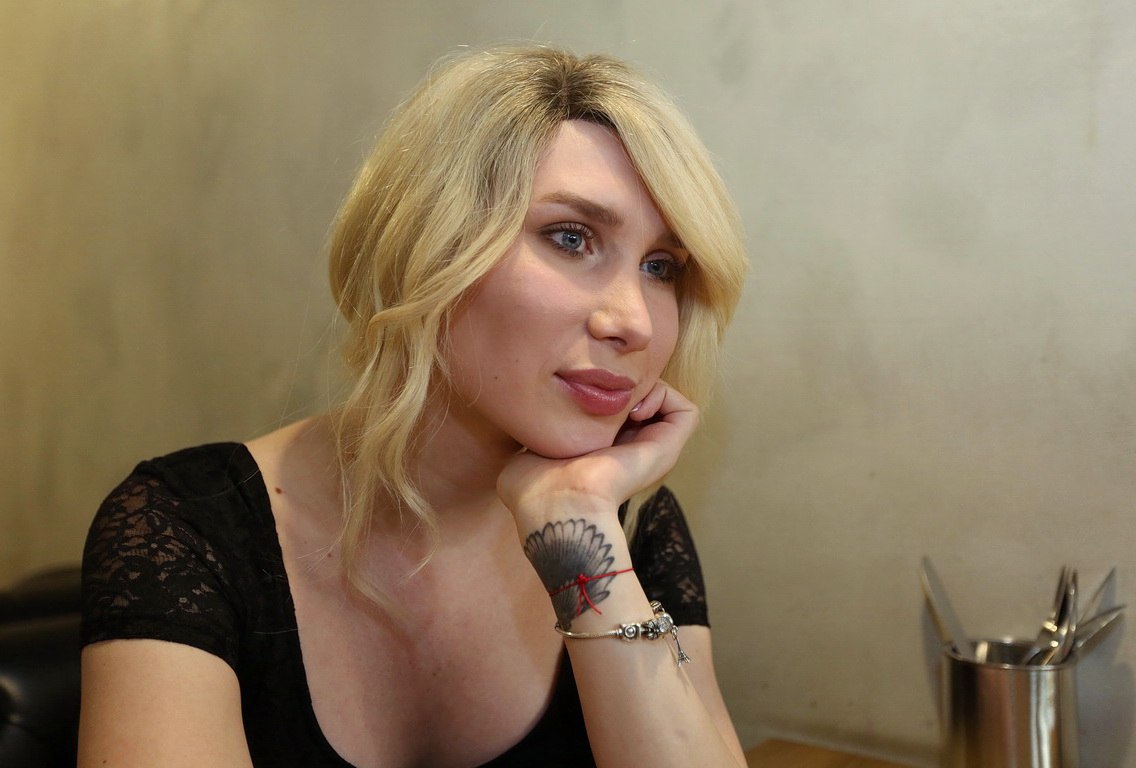Editor’s Note: This article is a part of the Journalism of Tolerance project by the Kyiv Post and its affiliated non-profit organization, the Media Development Foundation. The project covers challenges faced by sexual, ethnic and other minorities in Ukraine, as well as people with physical disabilities and those living in poverty. This project is made possible by the support of the American people through the U.S. Agency for International Development and Internews. Content is independent of the donors.
Andriana Doronina has long blond hair, a nice French manicure and wing-shaped tattoos on her wrists. She wears a classy little black dress and a light gloss on her lips. She has a model-like posture and gestures, and she can be seen on the catwalk from time to time.
But only three years ago, the 26-year-old Doronina would have introduced herself as Andriy. She was born as a boy, but never felt like one.
For her entire life, Doronina had wanted to be a woman, to wear women’s clothes and make-up, to have a boyfriend, and to hold his hand in public. She knew she wasn’t a gay man, but a woman trapped in a man’s body.
It came to the point, she says, when she started to “suffocate in her body,” and even thought of committing suicide. It was then that she decided to change her gender and finally be in harmony with herself.
“Everything irritates you. You look in the mirror – you’re outraged. Someone calls you ‘he’ – you hate it. It’s not you,” Doronina says. “I was fed up. I decided I needed to change. I wanted to be a happy person.”

Changing sex
She says she has completed 70 percent of the process of changing sex from male to female. She has passed all of the required medical and psychiatric check-ups, and so as soon as she has saved the $20,000 needed for an operation, she will fly to Thailand to undergo full sex-change surgery.
Doronina does not like to be associated with any vulnerable group or minority – including the community of lesbians, gay, bisexual and transgender, or LGBT people in Ukraine.
“I’m unique. It was my own choice alone to become myself completely,” she says.
Doronina is open about who she is – and to a wide audience: She has a popular personal video blog with more than 43,000 subscribers.
However, her being a transgender person is not the main theme of her channel on YouTube.
“My main message is not that I’m changing sex, but that we all have to fight our complexes,” she says. “I show myself as proof that nothing is impossible. If you want, you can achieve anything.”
Not everyone accepts her and her message, however. Doronina admits that she faces intolerance and teasing, but says she does not care much. Neither does she feel obliged to fight for the human rights of LGBT people.
“There will always be those who accept you, and those who don’t,” she says.
Andriana Doronina sits for an interview with the Kyiv Post in a Kyiv cafe on April 28. (Kostyantyn Chernichkin)
Like a girl
Doronina was born in Krasnoperekopsk, a small town in Crimea, about 650 kilometers from Kyiv. She says she was subject to bullying as a child because she looked and behaved differently from other boys.
“When a person was raised to know that there is only red and green, and he sees something pink, it seems wild. And that’s logical,” she says. “At that time even I didn’t understand what I was.”
Among other things, other children made fun of her because of her large lips.
“They said I looked like a girl,” she said.
When Doronina, then a male model, moved to Kyiv in 2012, people also pointed to her lips, saying they were fake.
Laughing, she now thanks God for her face, saying she hardly uses any make up. Still, she dreams of having cosmetic surgery performed on her face, as well as surgery on her vocal cords.
First things first though, Doronina said, adding that she has saved more than a half of money needed to pay for the sex-change surgery.
To make her living, Doronina sometimes works as a model, and she sells cosmetics to beauty salons.
Doronina says she is proud she is able to “go her own way,” and live as she wants to. She is also grateful to her friends and family for their support, especially that of her mother, who accepted Doronina and talked her out of committing suicide.
“She has lost her son, but she has gained a daughter. We now can discuss things we could never have discussed before,” Doronina says.
She says it would have been easier for her if she had been born a man, and had been a man inside her head.
“I wouldn’t have cared even if I’d been a gay man. But I wasn’t that lucky,” she says. “It is not a matter of changing your hair color or your teeth; it’s about your perception of yourself and the entire world around you.”

